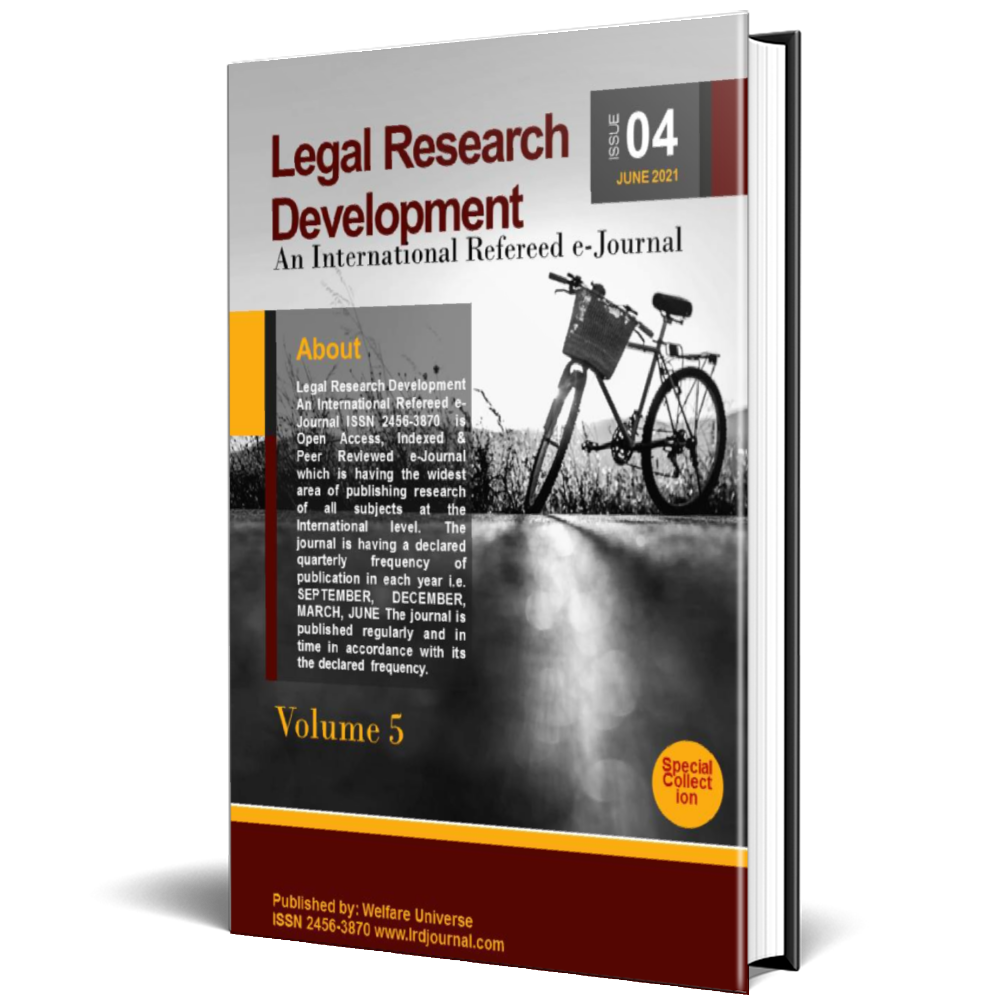Confessions And Law In India: A Legal Analysis
DOI:
https://doi.org/10.53724/lrd/v6n4.05Keywords:
Confessions, Law, Substantive Law, Procedural Law, Indian Penal CodeAbstract
The evaluation of the laws pertaining to confession in India brings to the fore the fact that ‘confessions’ has not been defined in any law. This paper is an attempt to examine the embodiment of the provisions pertaining to ‘confession’ under various enactments. The critical discussion encompasses the substantive law as well as the adjective law. Keeping in mind the title of this paper, the provisions have been dealt with in chronological order. The first enactment, which contains provisions pertaining to the confession, is the Indian Penal Code, 1860.
References
This is the meaning of the maxim Optimum Habemus Testem Confitentem Reun, cited from C.D. Fields, Law of Evidence,1395(1990)
State of H.P. v. Ranjit Singh,1979 Cr.L.J. NOC.210(HP).
Rabinarayan Das v. State, 1992 Cr.L.J. 261.
Sarkar’s, Law of Evidence, 12th ed., 224(1971).
A.I.R. 1966 S.C. 1906.
Jairam Ojha v. The State, A.I.R. 1968 Orissa 97.
Ramlal Lohar v. State of Assam, 1981 Cr.L.J.1734.
Miranda v. Arizona, (1966) 384 U.S. 436.
Smt. Nandini Satpathy v. P.L. Dani, A.I.R. 1978 S.C. 1025.
Miranda ruling received both support and extention in i) Edwards v. Arizona (1981) 451 U.S. 477; ii) Minnick v. Mississippi (1990) US Law Week 4037.
J G Starke QC, “United States Supreme Court broadens the “Miranda” Ruling as to the Limits on Police Interrogation”, 65 Aus.L.J. 243 (1991).
Archibald Cox, The Warren Court: Constitutional Decision as an Instrument of Reform, 86(1968).
Horace W.Jordan, Jr., “Fifth and Sixth Amendments--Changing the Balance of Miranda”, 77 J.Cr.L. and Criminology 666 (1986).
See Kamisar, Fred E. Inbau: “The Importance of Being Guilty”, 68 J. Cr.L. and Criminology 182(1977).
Joseph D. Grano, “Selling the Idea to Tell the Truth: The Professional Intent of Greater and Modern Confessions Law”,84 Mich.L.Rev.662 (1986).
See “India Today”, October 15, 1994.
See J.G.Stark, “The High Court’s Decision Requiring Trial Judges as a General Rule to Warn Juries About Confessional Statements to the Police”, 65 Aus. L.J. 314 (1991).
Ram Kishan v. Bombay, AI.R. 1955 S.C. 104.
1959 Cr.L.J. 48.
Dagdu v. Maharashtra, A.I.R. 1977 S.C. 1579.
Paramhans v. State, 1987 (1) Crimes 894 (S.C); Bhasala Singh v. State, (1987) 1 Crimes 844 (Orissa).
Kailash Nath Goyal, “Statements and Confessions of Accused: Some Decisions of Supreme Court”, 1960 Cr.L.J. 14.
Durga Das Basu, Criminal Procedure Code, 1(1979).
Annual Survey of Indian Law, volume VIII, 76 (1972); G.G.Modak, “Are Confessions made to Magistrates Otherwise Than in the Course of Investigation Admissible as Extra-Judicial Confessions?”, 1965 (2) Cr.L.J. 1.
Rattanlal and Dhirajlal, The Code of Code of Criminal Procedure, 159 (1991). See also, D. Jagannadha Rao, Law Relating to Confessions, 350 (1967).
As given under section 164(4s). Cr.P.C.
41st Report, Vol.I, Para 45.6.
Deepchand v. State of Rajasthan, A.I.R. 1961 S.C. 1527.
State of U.P. v, Singhara, A.I.R. 1964 S.C. 358.
P.W.Young, “Practical Evidence: Taking the Fifth”, 65 Aus.L.J. 412 (1991).
Durga Das Basu, Human Rights in Constitutional Law, 128 (1994).
Harvard Law Review, Vol. 18, 65 (1904-1905).
Harvard Law Review, Vol. 19, 469 (1905-1906).
Downloads
Published
How to Cite
Issue
Section
License

This work is licensed under a Creative Commons Attribution-NonCommercial 4.0 International License.










